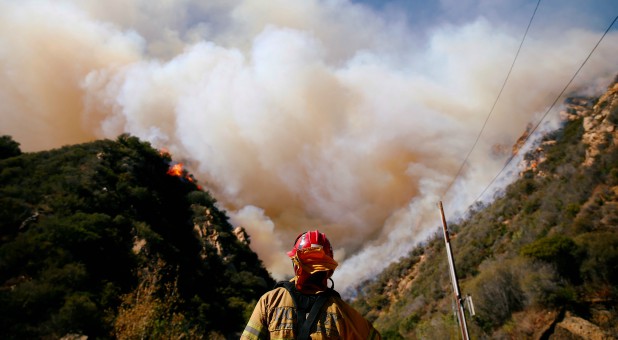The California wildfires have already claimed over 30 lives and destroyed thousands of homes and businesses. As the wildfires continue to blaze more, people are likely to experience a wide range of negative physical, emotional and spiritual challenges.
When Hurricane Katrina struck my community just six days after I moved to South Mississippi for my first professorship position, I saw firsthand how faith seemed to help people in my community make sense of and navigate life as they picked up the pieces of what was left.
As a psychologist, I felt compelled to empirically test my observations about faith and resilience in the aftermath of the storm. Following are spiritual and psychological insights my colleagues and I at the Humanitarian Disaster Institute at Wheaton College have learned from studying countless disaster survivors.
Our findings help give insight into valuable lessons about how personal faith can help survivors recuperate after a disaster—lessons that can inform how survivors and helpers respond to the California wildfires with practical, positive mental, emotional and spiritual support.
Local churches are one of the first places both congregation and community members turn to for help in the aftermath of a disaster. We found many people turn to local congregations or clergy for help before professional helpers, first responders or government. Even if the congregation was also suffering from the disaster or seemed ill-equipped to serve, people still sought help from local faith communities, especially among underserved populations. This means that congregations cleaning up or dealing with the effects of the California wildfires should be prepared to have open arms, as they are able, to those hurting from the storm.
Our research also shows that helping disaster survivors make spiritual meaning of their experience can have a significant positive impact. We found that spiritual meaning can be a buffer against negative mental health consequences like posttraumatic stress symptoms. Thus, it may helpful for those encountering the California wildfires to try and frame their experience in a meaningful spiritual context as a strategy for reducing negative mental health consequences. For example, a survivor who is able to find hope and purpose through their faith in the aftermath of a disaster is likely to experience fewer negatively intrusive thoughts, severe anxiety, and fear.
After a disaster, many people struggle psychologically with a perceived loss of a sense of control over their lives. But survivors who reported surrendering their disaster experience to God actually reported having a greater sense of control amidst the catastrophe. California wildfire survivors might similarly be able to find a deeper sense of peace believing that something bigger than themselves has command over their circumstances. Paradoxically, relinquishing one’s need to gain mastery over the destruction and chaos could be in part what California wildfire survivors need to face the daunting task of recovery ahead.
Our findings further demonstrated that even when disasters lead to loss of basic survival needs, drawing on spiritual resources (for example, religious coping, spiritual social support) helps protect survivors’ psychological resources like hope and optimism. While food and water might become scarce for some California wildfire survivors, those who are still able to find comfort in their faith may find that their sense of safety doesn’t feel as threatened. An additional study we conducted revealed this not only improved emotional well-being but also health-related quality of life among survivors.
These psychological comforts must also be cared for alongside real physical needs. As might be expected, there is a significant relationship between resource loss (e.g., home is destroyed) and mental health. For example, in one of our studies, we found financial loss was a significant predictor of depression. Thus, a good rule of thumb to remember when helping is: “aid occurs when assistance and needs meet.”
Don’t assume you know exactly what survivors’ physical needs are; inquire about how you can help. Start with prayer and by focusing on attending to basic needs like shelter, safety and medical issues first. Know that attending to physical needs through what some veteran faith-based responders call “water bottle ministry,” you are caring for spiritual and emotional needs simultaneously.
Overall, our findings suggest faith bolsters positive outcomes among disaster survivors—but there’s more to it than just being “religious”—resilience comes from a survivor’s actively engaged faith.
Dr. Jamie Aten is the founder and executive director of the Humanitarian Disaster Institute and Blanchard Chair of Humanitarian & Disaster Leadership at Wheaton College (Wheaton, Illinois). His latest books include the Disaster Ministry Handbook (InterVarsity Press) and A Walking Disaster: What Katrina and Cancer Taught Me About Faith and Resilience (Templeton Press, forthcoming January 2019). In 2016, he received the FEMA Community Preparedness Champion award at the White House. Follow on Twitter at @drjamieaten or visit his website jamieaten.com.
See an error in this article?
To contact us or to submit an article






















